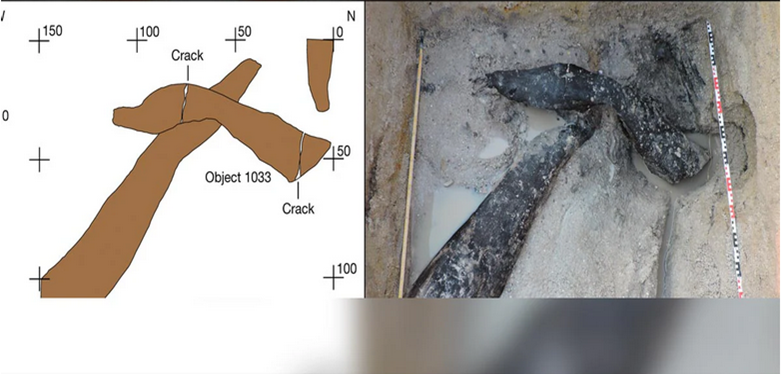Researchers discover a half-million-year-old wooden structure in Africa

Archaeologists have discovered the oldest wooden structure ever made by man, about half a million years old, and note in a recent study that its construction shows that early humans had advanced technical capabilities.
The structure was discovered at the prehistoric site of Kalambo Falls, in what is now Zambia. The history of the site, which enjoyed good preservation conditions, dates back to at least 476 thousand years, that is, before the history in which the human race known as Homo sapiens is believed to have appeared.
The structure consists of two interlocking trunks, connected transversely by a crack intentionally made to build a structure, which may have been the basis of a raised platform, a corridor, or a habitat, according to the study published by the journal “Nature” on Wednesday. . A group of wooden tools were also discovered at the site, including a digging stick.
Human use of wood has previously been proven in ages this ancient, but it was limited, as it was used to light fires, or sharpen sticks for hunting or picking fruits.
Larry Parham, a professor at the British University of Liverpool and the main author of the study, told AFP that the oldest wooden structure known to date dates back only nine thousand years.
The archaeologist did not expect to find such a treasure while excavating the prehistoric site of Kalambo, which is located on the banks of the river of the same name, above 235-meter-high waterfalls.
The researchers explained in a statement, “It is rare to find wood in such ancient sites because it usually rots and is damaged. But in Kalambo Falls, "It maintained permanently high water levels."

In the 1950s and 1960s, preliminary excavations revealed pieces of wood that could not be dated.
The date of the new objects discovered in 2019 was determined by the fluorescence dating technique of the sediments surrounding the objects. This method allows you to determine when it was last exposed to sunlight before being buried, explains co-author Professor Geoff Dowler from Aberystwyth University in Wales.
Abstract capabilities
Analysis showed that the age of the sediments is at least 476 thousand years, “which proves that this site is much older than thought,” according to the scientist. The results also show that the facility was inhabited long before Homo sapiens, whose oldest fossils date back to about 300,000 years.

The research was not able to determine the human race that was present, but Parham does not rule out that the occupants of the site are descendants of Homo heidelbergensis, an extinct species that lived about 700,000 to 220,000 years before our era.
With the exception of a fossilized Homo heidelbergensis skull, which was discovered in Zambia in the 1920s, “there are no other known hominins in the region.”
In any case, the discovery has “changed Parham’s view” of our early ancestors, with the archaeologist saying: “They used their intelligence to transform their environment and make their lives easier, if only by creating a sitting platform on the banks of the river.”

These ancestors were able to create “something never seen before”: unlike the size of a stick, which is easy to observe and imitate, creating two pieces with the aim of assembling them shows, according to the scientist, abstract capabilities.
Sophie Archambault du Bon, a prehistoric scientist and professor at Jean Moulin Lyon III University in France, who was not involved in this research, said, “The fact that they were able to work with wood on a large scale presupposes cognitive abilities such as planning and visualization.” "The final product before implementing it, and moving things mentally in space."
In response to questions from Agence France-Presse, the researcher added, “These abilities have already been hypothesized through the study of cut stone tools,” and they were common in those ancient times.

According to the study's authors, the structure was suitable for "sustainable occupation," which "raises doubts about the idea that these early humans were nomadic."
"At Kalambo Falls, not only did they have a permanent water source, but the forest that surrounded them provided them with enough food to allow them to settle and build structures," the researchers say in this study.
This is a hypothesis that still needs to be proven, because these facilities may also be “seasonal,” according to Sophie Archambault du Bon.
Source: websites

